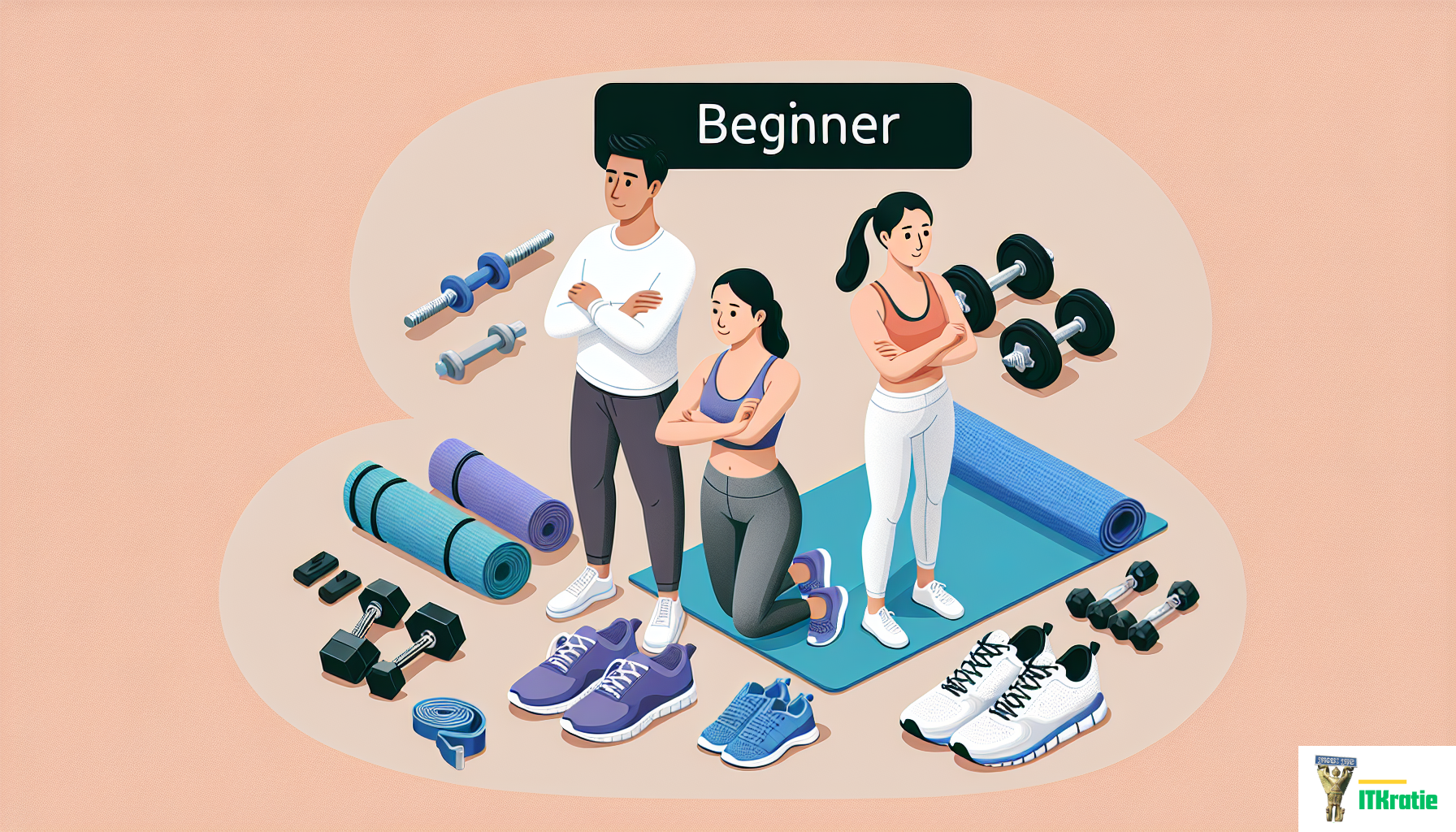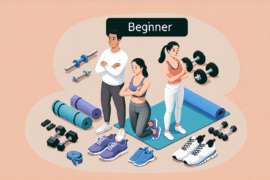You’re in luck! If you’re new to exercise but eager to start, there are plenty of ways to jump in without any prior experience. This article will guide you through simple and effective techniques for getting active and staying motivated, even if you’ve never set foot in a gym or tried a workout routine before. From light cardio and strength-training exercises to tips on finding a workout buddy, we’ve got you covered on your journey to a healthier, more active lifestyle. So don’t worry about your lack of experience – with a bit of determination and some helpful guidance, you’ll be well on your way to becoming a fitness pro in no time!

Finding Motivation
Setting clear goals
When starting your fitness journey, it’s important to set clear goals. Think about what you want to achieve through exercise. Do you want to lose weight, build strength, improve your cardiovascular health, or simply feel more energized? Setting specific and attainable goals not only gives you something to work towards but also helps keep you motivated along the way.
Finding your why
Discovering your “why” is a powerful motivator. Why do you want to start exercising? Do you want to set a good example for your children, improve your mental health, or increase your confidence? Identifying your reasons for wanting to exercise can provide you with the extra motivation and determination to stick with it, even when things get tough.
Creating a supportive environment
Having a supportive environment can make a world of difference in your fitness journey. Surround yourself with people who believe in you and your goals. Share your aspirations with friends and family, and consider finding an exercise buddy who can join you on your journey. Additionally, create an environment that supports your fitness goals by making healthy snacks easily accessible and removing any potential obstacles that might hinder your progress.
Educating Yourself
Understanding exercise basics
Before diving into any exercise program, it’s essential to understand the basics. Educate yourself on the benefits of exercise, the different muscle groups, and the overall impact it can have on your health. Knowing these fundamentals will not only give you a better understanding of the exercises you’ll be doing but also help you appreciate the importance of your fitness journey.
Learning about different types of exercises
There are countless types of exercises to choose from, each targeting different areas of the body and offering unique benefits. Take the time to research and learn about various exercises like cardio, strength training, yoga, Pilates, and more. This knowledge will help you diversify your routine and find activities that you enjoy and that align with your goals.
Researching proper form and technique
Proper form and technique are crucial for maximizing the effectiveness of your workouts and preventing injuries. Take the time to research and educate yourself on the correct form for each exercise you plan to incorporate into your routine. Pay attention to details such as posture, alignment, and breathing techniques. This knowledge will ensure that you are performing exercises correctly and getting the most out of your workouts.
Starting Slow
Listening to your body
When starting your exercise journey, it’s important to listen to your body. Pay attention to any discomfort or pain you may be experiencing during or after your workouts. It’s normal to feel some muscle soreness, but if you’re experiencing intense pain, it’s important to take a step back and reassess. Pushing through pain can result in injuries and setbacks, so always prioritize your body’s signals and adjust your workouts accordingly.
Choosing low-impact activities
If you’re new to exercise or have limitations, starting with low-impact activities can be a great way to ease into a routine. Activities like walking, swimming, cycling, or using an elliptical machine can provide a cardiovascular workout without putting excessive stress on your joints. These activities allow you to build endurance and strength while minimizing the risk of injury.
Gradually increasing intensity and duration
As you become more comfortable with your workout routine, gradually increase both the intensity and duration of your exercises. This progressive approach allows your body to adapt and prevents plateaus in your progress. However, it’s important not to push yourself too hard too soon. Slow and steady progression is key to building endurance and strength while minimizing the risk of injury.
Seeking Professional Guidance
Consulting with a doctor
If you’re new to exercise or have any underlying health conditions, it’s always a good idea to consult with your doctor before starting a new fitness program. They can provide valuable insight into any precautions you may need to take or modifications that can be made to keep you safe during exercise. Your doctor can also help you set realistic goals based on your current health status.
Hiring a personal trainer
A personal trainer can be an excellent investment, especially if you’re new to exercise. They have the knowledge and expertise to design a personalized workout program tailored to your needs and goals. A personal trainer can also teach you proper form and technique, provide motivation and accountability, and help you push past any mental or physical barriers.
Joining a beginner-friendly workout class
If you prefer a group setting, consider joining a beginner-friendly workout class. Many fitness facilities offer classes specifically designed for individuals with little or no experience. These classes typically have instructors who are experienced in working with beginners and can guide you through exercises while providing modifications based on your fitness level. Working out with others in a supportive environment can be motivating and fun.

Setting Realistic Expectations
Accepting your current fitness level
It’s essential to accept and embrace your current fitness level when starting your exercise journey. Everyone has different starting points, and it’s important not to compare your progress to others. Celebrate where you are today and focus on the positive changes you can make going forward. Remember that progress takes time, and with consistency and determination, you will continue to improve.
Embracing small progress
Instead of expecting immediate and significant changes, focus on celebrating small victories along the way. Whether it’s running an extra minute or increasing the weight you’re lifting, every small achievement is a step in the right direction. By acknowledging and celebrating these milestones, you’ll stay motivated and enthusiastic about your fitness journey.
Avoiding comparison to others
In the age of social media, it’s easy to get caught up in comparing yourself to others’ fitness journeys. Remember that everyone’s path is unique, and comparing yourself to others can be demotivating and even detrimental to your progress. Instead, focus on your own goals and what you can do to improve. Stay inspired by others’ achievements but remember that your journey is yours alone.
Finding Enjoyment
Exploring different activities
Exercise doesn’t have to be boring or monotonous. Explore different activities to find what you genuinely enjoy. Try out various fitness classes, sports, outdoor activities, or even dance classes. Not only will you be more motivated to exercise when you enjoy it, but you’ll also be more likely to stick with it long term.
Joining group exercises
Joining group exercises can be a fantastic way to find motivation and enjoyment in your fitness journey. Not only will you have the support of others, but you’ll also be able to feed off the energy and motivation of the group. Whether it’s joining a running club, a group fitness class, or playing a team sport, the camaraderie can make exercising a fun and social experience.
Listening to music or podcasts
Listening to music or podcasts during your workouts can be a game-changer. Create a playlist filled with your favorite songs or find engaging podcasts that you can listen to while exercising. Not only will this help pass the time, but it can also distract you from any discomfort or fatigue. Music and podcasts can provide an extra boost of motivation and make your workouts more enjoyable.
Building a Routine
Scheduling dedicated exercise time
To make exercise a consistent part of your life, it’s essential to schedule dedicated exercise time. Treat your workouts as non-negotiable appointments with yourself and prioritize them accordingly. Consider blocking off specific time slots in your daily or weekly schedule that are solely reserved for physical activity. By making exercise a priority, you’re more likely to stick to your routine.
Creating a workout plan
Having a workout plan can provide structure and direction to your fitness journey. Sit down and create a plan that incorporates a variety of exercises and targets different muscle groups. Outline specific exercise sessions, including warm-up and cool-down periods, and duration for each workout. Having a plan in place takes the guesswork out of your workouts and keeps you on track.
Tracking your progress
Tracking your progress is key to staying motivated and seeing the results of your hard work. Keep a record of your workouts, noting the exercises you performed, the number of sets and repetitions, and any modifications or progressions you made. Additionally, consider tracking other metrics such as weight, body measurements, or how you feel both physically and mentally. Seeing your progress on paper can be highly motivating and make you want to continue pushing forward.
Staying Consistent
Making exercise a habit
Consistency is crucial when it comes to seeing and maintaining results. Make exercise a habit by incorporating it into your daily routine. Once you’ve established a schedule, stick to it as much as possible. Treat exercise as an essential part of your day, just like eating or sleeping. Over time, it will become second nature, and you’ll find it easier to stay dedicated to your fitness goals.
Overcoming obstacles and setbacks
It’s inevitable that you’ll face obstacles and setbacks along your fitness journey. Whether it’s an injury, a busy schedule, or a lack of motivation, it’s important to find ways to overcome these challenges. Get creative with your workouts, find alternative exercises or activities, and learn to adapt when things don’t go as planned. Remember that setbacks are a normal part of any journey, and it’s how you respond to them that matters.
Celebrating small victories
Don’t forget to celebrate your achievements along the way, no matter how small they may seem. Recognize and reward yourself for sticking to your routine, reaching milestones, or conquering a challenging workout. Celebrating these victories helps keep you motivated and reinforces the importance of your fitness journey. Remember that progress is not always linear, so embrace and acknowledge the small wins.
Taking Care of Your Body
Warming up and cooling down
Before starting any exercise, it’s crucial to warm up your body. A warm-up session prepares your muscles and joints for the upcoming intensity. It can involve light cardiovascular exercises, such as jogging in place or jumping jacks, followed by dynamic stretches that target the major muscle groups. Cooling down after your workout with static stretches helps your body gradually return to its resting state, reducing the risk of muscle soreness and injury.
Stretching properly
Stretching is an essential component of any exercise routine. Incorporate both dynamic stretches, which involve controlled movements, and static stretches, which involve holding a stretch position for a certain period of time. Focus on stretching the major muscle groups involved in your workouts. Proper stretching helps improve flexibility, reduce muscle tightness and soreness, and can even enhance athletic performance.
Getting enough rest and recovery
Rest and recovery are key to achieving optimal results and avoiding burnout. Allow your body time to recover and repair itself between workouts. Adequate rest days are essential for muscle growth and preventing overuse injuries. Additionally, prioritize getting enough sleep, as it plays a vital role in your overall health and recovery. Remember that rest is just as important as the exercise itself, so don’t neglect this crucial aspect of your fitness journey.
Seeking Support
Finding an exercise buddy
Finding an exercise buddy can significantly enhance your fitness journey. Having someone to exercise with provides accountability, motivation, and support. Find a friend, family member, or coworker who shares similar fitness goals and commit to working out together. You can encourage each other, celebrate successes, and even try new activities together. Exercising with a buddy can make your workouts more enjoyable and make it easier to stay consistent.
Joining online communities
In today’s digital age, there are numerous online communities dedicated to fitness and exercise. Joining these communities can provide you with a sense of belonging, support, and a wealth of knowledge. Participate in forums, follow fitness influencers on social media, or join virtual workout classes. Engaging with like-minded individuals who share similar goals can keep you motivated, inspire new ideas, and provide you with valuable tips and advice.
Sharing your journey with others
Don’t be afraid to share your fitness journey with others. Whether it’s talking to friends and family, writing a blog, or posting about it on social media, expressing your goals and progress can help keep you accountable and motivated. Sharing your successes and challenges with others can also inspire and encourage those around you. Remember, you never know who you might inspire by simply sharing your story.
Embarking on a fitness journey can feel overwhelming for someone with no previous experience. However, by following these steps and adopting a positive mindset, you can pave the way for a successful and enjoyable exercise routine. Remember to set clear goals, educate yourself, start slow, seek professional guidance when needed, set realistic expectations, find enjoyment in your workouts, build a routine, stay consistent, take care of your body, and seek support when necessary. With dedication, patience, and a friendly tone towards yourself, you will be well on your way to achieving your fitness goals.
